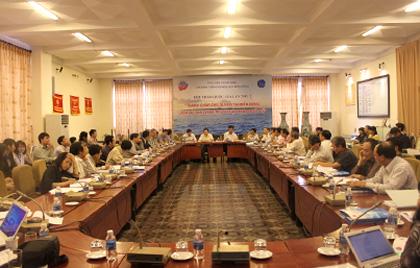

On 26th April 2011, South China Sea Studies Program, Diplomatic Academy of Vietnam organized the Second National Conference on South China Sea titled "The Sovereignty Disputes in the South China Sea: History, Geopolitics and International Law” in Hanoi. This is an opportunity for scholars studying the South China Sea in the country to share information, and widely gather opinions, reviews, comments on the recent development and implications in the South China Sea.

Image: Overview of the Second National Conference on the South China Sea
Regarding the legal basis and history of Vietnam and stakeholders' sovereignty, participants said Vietnam has historical evidence and legal basis to claim its sovereignty in the Hoang Sa and Truong Sa. Vietnam has actual sovereignty, peace, and ongoing implementation of its sovereignty there. Some comments show clearly that although we have gathered a number of evidence, we still need to continue to collect, complete original documents, translate them into various languages and publish widely the documents along with to modify and supplement inaccurate and missing information. On the other hand we should not be subjective, but should continue to consolidate and improve our arguments.
Regarding claims of the Philippines, the paper presented in the first session agrees that the Philippines’ strong point is geographically closest to the Spratly Islands compared to China, Vietnam, Malaysia and Brunei. However, forms of acquisition of the Croma in 1956 were private, not on behalf of the state.
On China’s point of view, the delegates said that China's point of view on sovereignty in the South China Sea based on the mode of territorial acquisition by possession and the mode of territory acquisition by international treaties. Regarding the mode of territorial acquisition by possession, some opinions said that China did not meet the requirements of peace pursuit, actually and under the name of the state. The scholars also said that the system of Chinese geographical names is not based on historical factors, and gathering places without the original documents. A number of research projects in China as quoted on the ancient material, often cited fragmentally, while others cited from correct sources give misconceptions about the source of content.
Participants also agreed that the study on the legal basis of the stakeholders are important and play an equivalent role to our basis’ research. Therefore, it is necessary to review the history, materials and maps of the stakeholders.
Regarding the recent developments in the South China Sea, the delegates said that there have recently been some changes in several aspects. First, the South China Sea issue, from just a dispute among regional countries, has become one of international affairs which was brought to discussion in the international multilateral forums such as ARF ... The second is the change from ASEAN. Currently the South China Sea has become quite a prominent issue in the agenda of the ASEAN, expressing determination to move from the Declaration on the Conduct of Parties in the South China Sea (DOC) to the Code of Conduct in the South China Sea (COC). Third, China's stance has many changes. China now apparently tends to make more use of the UN Convention on the Law of the Sea, changes in diplomatic behaviours, as well as some new points on field. Fourth, the negotiations on the South China Sea issue have been also changing as the countries began direct talks on the COC.
Regarding regional cooperation, delegates agreed that the South China Sea is not just the matter of conflict, dispute, confrontation, but also an opportunity for countries to strengthen cooperation.
Regarding scenarios that may occur in the South China Sea in the coming time, the scholars said that there may be four scenarios: First, regional situation will be now better if the parties, especially China, behave in accordance with what it has said, that is "creating a peaceful and cooperative South China Sea." Second, the situation basically remains as it is now when collaboration and conflict are mixing. Third, the situation will be worse than it is now, i.e., the conflicts and disputes outweigh cooperation but there’s no large-scale conflict. Fourth, the major conflict happens.
Regarding the development of a Code of Conduct (COC) at South China Sea, the scholars say that COC may not be a means to resolve disputes but would be a tool for confidence building in order to create an environment of peace, stability, and mutual trust and to encourage cooperation in the use and management of the South China Sea peacefully. Therefore, the COC should not only be limited as the commitment of the parties to implement the framework principles but should determine what acts are not allowed. Besides, COC should also specify the conditions and appropriate mechanisms to allow the parties to promote dialogues, and reduce tensions. In the near future, the parties should promote full implementation of DOC between China and ASEAN signed in 2002.
The conference was held in the open frank atmosphere referring to a number of current issues on the South China Sea. Along with the International Conferences, National Conference on South China Sea is an important channel for mobilizing the intelligentsia over the South China Sea’s issue.